Vice President Harris held a roundtable discussion on marijuana reform, thanking participants for their contributions to the dialogue, particularly highlighting Governor Andy Beshear's progressive stance on challenging traditional policies in Kentucky and nationally. The Vice President emphasized the importance of equal justice under the law, noting disparities in the criminal justice system, including her own efforts in criminal justice reform, such as banning chokeholds, restricting no-knock warrants, and creating a database to track law enforcement misconduct.
She discussed initiatives aimed at supporting reentry for formerly incarcerated individuals, including making Small Business Administration loans and Pell Grants accessible to them and ensuring they're informed about available benefits like Medicaid upon release. The Vice President also addressed federal drug policy inequities, particularly the historical sentencing disparities between crack and powder cocaine, and announced efforts to address these, including pardoning thousands with federal convictions for simple marijuana possession and urging states to follow suit.
Vice President Harris called for a reassessment of marijuana's classification under federal drug schedules, criticizing its current placement as equal to heroin and more dangerous than fentanyl as "absurd" and "unfair." She concluded by acknowledging the progress made but stressed the need for continued efforts towards fair and just marijuana policies, thanking Governor Beshear and Fat Joe for their roles in the conversation.
At the Gridiron Club and Foundation Dinner in Washington, D.C., President Biden delivered a speech filled with humor, political jabs, and reflections on democracy. He began with light-hearted remarks about his bedtime and the age of some attendees, quickly moving to tease about political figures such as Mitch McConnell and Ron DeSantis. The President humorously mentioned his administration's achievements and made playful remarks about figures from both political parties and the media.
The President didn't shy away from satirical comments on controversial topics, including student debt cancellation and his relationship with prominent business figures and politicians across the aisle. He playfully addressed the Republican party's challenges, including their attempts at impeachment inquiries, and took a jovial yet pointed stance on the serious matter of election integrity and democracy.
President Biden emphasized the press's vital role in a democratic society, acknowledging their importance and the risks journalists face. He highlighted the challenges to democracy, from foreign threats like Putin's actions in Europe to domestic issues such as disinformation and the undermining of basic freedoms. He commended the press for being a "pillar of any free society" and stressed the importance of their work in these troubled times.
President Biden concluded his remarks by toasting the free press and democracy, underscoring the need for truth, decency, and courage in journalism and governance to ensure the enduring strength of democracy.
President Biden's re-election campaign released a report on Sunday showing a significant fundraising effort, bringing in over $53 million in February and holding $155 million in cash. This fundraising peak occurred ahead of The President securing the Democratic nomination in March and followed a surge in donations after his State of the Union address, which raised $10 million in 24 hours. The campaign highlighted that it has received contributions from about 1.3 million donors, with nearly 3.4 million donations made, and emphasized that 97% of these donations were under $200.
President Biden undertook a fundraising tour in California in February, with events in Los Angeles and San Francisco. Following the GOP primary in South Carolina, The President's campaign experienced a $1.6 million boost in grassroots revenue within 48 hours.
Source: Reuters




